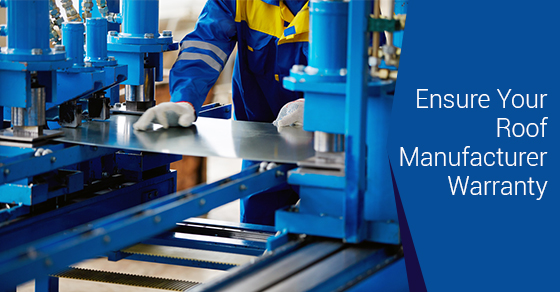
May 23, 2016
How To Void Your Manufacturer Warranty
Congratulations on the installation of your new commercial roof that, with proper maintenance, may last the lifetime of your business structure. Or at the very least, you will get to enjoy a few years of zero roofing maintenance costs owing to the long warranty that came with the new roof. Or maybe not!

Many building owners only look at the length of the warranty without gaining proper understanding of the terms and conditions of the warranty. Failure to understand what is and what isn’t included in the warranty, as well as the conditions of the coverage can lead to unpleasant surprises later on.
As good as warranties seem to be, they are designed to protect the manufacturer more than the consumer. Manufacturers hire teams of lawyers to compose contracts that try to limit their own liability if and when a fault or problem arises concerning their product. As such, there are three questions you should ask yourself before you sign off on your roofing warranty:
What type of roof warranty am I getting?
- Manufacturer roof warranty vs. contractor roof warranty
- Labour-only warranty vs. material-only warranty vs. full-system warranty
- Workmanship warranty vs. labour warranty
You can get a roof warranty from the manufacturer of the roofing material (manufacturer roof warranty) and from the company installing the roof (contractor roof warranty).
Manufacturer warranties usually cover only the material, though some cover the entire roofing system. Most manufacturer warranties require the installing contractor to perform warranted repairs for a few years after installing a new roof. Contractor roof warranties, on the other hand, usually only cover workmanship, and not the materials.
Labour-only warranties typically only cover the labour necessary to cater for a roof defect without including the cost of materials. They are offered by the roof installer, and are different from roof workmanship warranties, implying that they may not cover repairs pertaining to installation errors.
Roofing-material warranties only cover the manufacturing defects and possible premature deterioration for the duration of the warranty; they do not cover the repair costs for leaks. Additionally, they only cover the roof membrane, but not other accessories of roofing systems such as the metal edges, flashings, adhesives, etc. As such, this type of warranty only covers the cost of materials to repair or replace the membrane.
Full-system warranties cover everything, from the materials to manufacturer approved accessories, flashings, and metal work used in the original installation to the total cost of labour for leak repairs within the terms and conditions of the warranty. Some include workmanship cover, but not all manufacturers offer cover for poor installation.
A roof workmanship warranty is the only protection you get from the installer against installation defects. Labour warranties only cover the costs involved in the repair of a defective roof, but not the cost of repairs associated with installation errors or failures. This is why it is critical that you get a reputable company to install your roofing system.

What does the typical roof warranty cover?
This depends on the type of warranty awarded. So, always go through the fine print and exclusions to know what is covered, and what may require an extra fee when fixing. Also, some types of coverage may require the installation of certain roof materials, such as high wind coverage or puncture coverage, increasing the overall cost of installation.
Some of the items that may be covered in your warranty include:
- Roof leak repair
- High winds
- Puncture damage
- Roof hail damage
Those not covered include:
- Standing or ponding water
- Consequential damages – interior/equipment damage caused by leaks, floods, tornadoes , fires, etc.
- Existing moisture during installation
- Replacement of your faulty roof
How can you void your Roof Warranty?
- Not performing Regular maintenance – Regular maintenance will prolong the life of any roof. Think of it as an oil change, even when you buy a brand new car you still need the oil changed.
- Not performing regular Inspections – This should be performed at least once a year, preferably twice. After winter preferably as is the most stressful season for any building envelope.
- Not conducting additional inspections immediately after extreme hail, heavy rains, fires, etc.
- Not assuring that your roof is kept clean and free of debris.
- Not warning equipment servicemen going on the roof to be careful with their tools and materials. The smallest nail can puncture the roofing membrane causing voids for water entry into your building.
- Allowing unqualified people or businesses to maintain your roof.
- Allowing up traffic on the roof without ensuring qualifications.
- Not taking a reactive approach to maintaining your roof.
- Dealing with firms who will not stand behind their work! No product is better than the applicator.
If you are in the process of buying a new roof, make sure you read through the roof warranty and ask for clarifications where things are not clear to avoid costly surprises.
Back to Blog